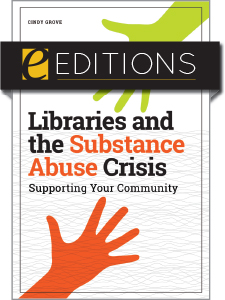
Libraries and the Substance Abuse Crisis: Supporting Your Community—eEditions e-book
The download link for this product can be found on the final confirmation screen after you complete your purchase, and may also be accessed from your Account Profile. For more information about ALA eEditions file types and how to view them on eReaders, desktop computers, and other devices, see this page.
Primary tabs
You don't need to be an ALA Member to purchase from the ALA Store, but you'll be asked to create an online account/profile during checkout to proceed. This Web Account is for both Members and non-Members. Note that your ALA Member discount will be applied at the final step of the checkout process.
If you are Tax-Exempt, please verify that your account is currently set up as exempt before placing your order, as our new fulfillment center will need current documentation. Learn how to verify here.
- Description
- Table of Contents
- About the author
- Reviews
Check out this book's website now!
The opioid epidemic, and other behavioral health issues such as alcohol and drug abuse, directly impact every community across the nation; and, by extension, public libraries’ daily work. Because libraries are not only trusted guardians of information but also vital community centers, people struggling with addictive behaviors as well as their family members and friends often turn to the library for help. But many library workers feel overwhelmed, finding themselves unprepared for serving these patrons in an effective and empathetic way. This book encourages readers to turn their fears and uncertainty into strengths and empowerment, offering to-the-point guidance on welcoming people with substance use disorders and their loved ones through policy, materials, outreach, collaboration, programs, and services. Written by a frontline librarian whose personal experiences inform the book, this resource
- explores the library’s role in the fight against addiction and how to become part of the solution by combating stigma;
- provides background on understanding how substance abuse and related behaviors affect different age groups and populations;
- explains how to be proactive regarding library safety and security by carefully crafting library policies and effectively communicating them to staff;
- offers real world guidance on training library staff, including pointers on recognizing observable signs of drug abuse and responding appropriately and safely to uncomfortable or potentially dangerous situations;
- discusses safeguards such as a needle disposal unit, defibrillator, and Naloxone;
- gives tips on marketing, outreach, and programming, from putting together displays of materials and resources to partnering with local organizations; and
- recommends useful websites, documentaries, and additional resources for further learning.
By making their own contributions to changing the way people struggling with substance abuse are treated in society, libraries can demonstrate that resilience can transcend crisis.
Preface
Acknowledgments
Introduction: We Have a Crisis
Chapter 1 The Library’s Role in the Fight Against Addiction
Chapter 2 Understanding Addiction
Chapter 3 People in Distress
Chapter 4 Behavior and Stigma
Chapter 5 Library Safety and Security
Chapter 6 Library Policies
Chapter 7 Library Services
Chapter 8 Library Outreach and Marketing
Chapter 9 Training for Staff
Conclusion: Being Part of the Solution
Appendixes
- Appendix A Observable Signs of Common Drugs
- Appendix B Further Reading and Viewing
Cindy Grove
Cindy Grove is the director of a public library in New England. She has worked in libraries for over sixteen years and also has five years’ experience working with various social service agencies. Throughout her life she has worked with people with substance use disorders and their loved ones. She has also appeared as a panelist on several webinars that focus on substance use disorders and mental health.
"Packed with practical information on recognizing those dealing with substance abuse issues, planning services for them and their families, and safeguarding spaces and training staff for emergencies."
— Library Journal
"Written by a library manager and former social worker, it contains a number of practical and achievable approaches from her personal experience as a librarian developing services and policies to create a supportive environment for everyone ... This title is written in a clear and easy to understand manner, with short instructive chapters and a useful appendix that includes suggested readers’ advisory titles for adults, young adults and children."
— Journal of the Australian Library and Information Association


